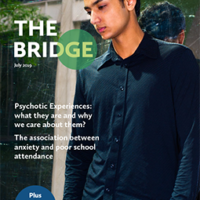ACAMH Website Content Types
-

Conduct Disorders and Aggression Editorial
This editorial edition of The Bridge is on the topic of conduct disorders and aggression.
Read more -

Autism Spectrum Disorders and Obsessive Compulsive Disorder Editorial
This edition of The Bridge focusses on Autism Spectrum Disorders and Obsessive Compulsive Disorder.
Read more -

Depression, Self-harm and Suicide Editorial
This edition of The Bridge focusses on depression, self-harm and suicidal thoughts. These are important clinical topics.
Read more -

Psychological resilience in young people – Editorial
Having spent a lot of time on a camp bed in a paediatric ward with young people and their families, some of whom were inpatients for weeks on end and facing huge physical challenges, it has made me wonder a great deal about the elements of psychological resilience in young people. This is a theme for this edition.
Read more -

Age-related immaturity in the classroom can lead to ADHD misdiagnosis
Researchers from Australia, France, the USA and the UK have come together to compile a 2019 Annual Research Review for the Journal of Child Psychology and Psychiatry on the correlation between a late birth-date (relative to the school year) and risk of attention-deficit/hyperactivity disorder (ADHD).
Read more -

Should emotion dysregulation be considered a core component of ADHD?
New data from researchers in the USA suggest that emotion dysregulation should be included as a core component of attention-deficit/hyperactivity disorder (ADHD) rather than viewed as comorbidity.
Read more -

New developmentally appropriate diagnostic criteria need to be established to identify ADHD early in preschoolers
Attention-deficit/hyperactivity disorder (ADHD) typically emerges during preschool years and in a subset of children, can persist into adolescence. Early identification might help promote a favourable ADHD trajectory, but the current predictors of ADHD persistence are insufficient.
Read more -

Emotional impulsivity and deficient emotional self-regulation might be core symptoms of ADHD
A large proportion of children with attention-deficit/hyperactivity disorder (ADHD) exhibit notable emotion-related problems (or “emotional symptoms”). These emotional symptoms seem to associate with poor quality of life, impaired social adjustment and reduced marital status.
Read more -

Gender-specific pathways mediate the risk of substance use in adolescents with ADHD
Data suggest that children with attention-deficit/hyperactivity disorder (ADHD) are more likely to start smoking tobacco and/or marijuana earlier in childhood than unaffected children, and then escalate use during adolescence. Now, a study by researchers at the University of Minnesota has examined the mediating pathways underlying this association between childhood ADHD and later substance-abuse problems.
Read more -

Guidelines on service transition for young people with ADHD
Recent research has led to the increasing recognition that ADHD can often be a life span disorder, meaning that a subset of affected children will eventually need to transition to adult services. Unfortunately, much research has highlighted the difficulties experienced by young people in transitioning from children’s to adult services.
Read more